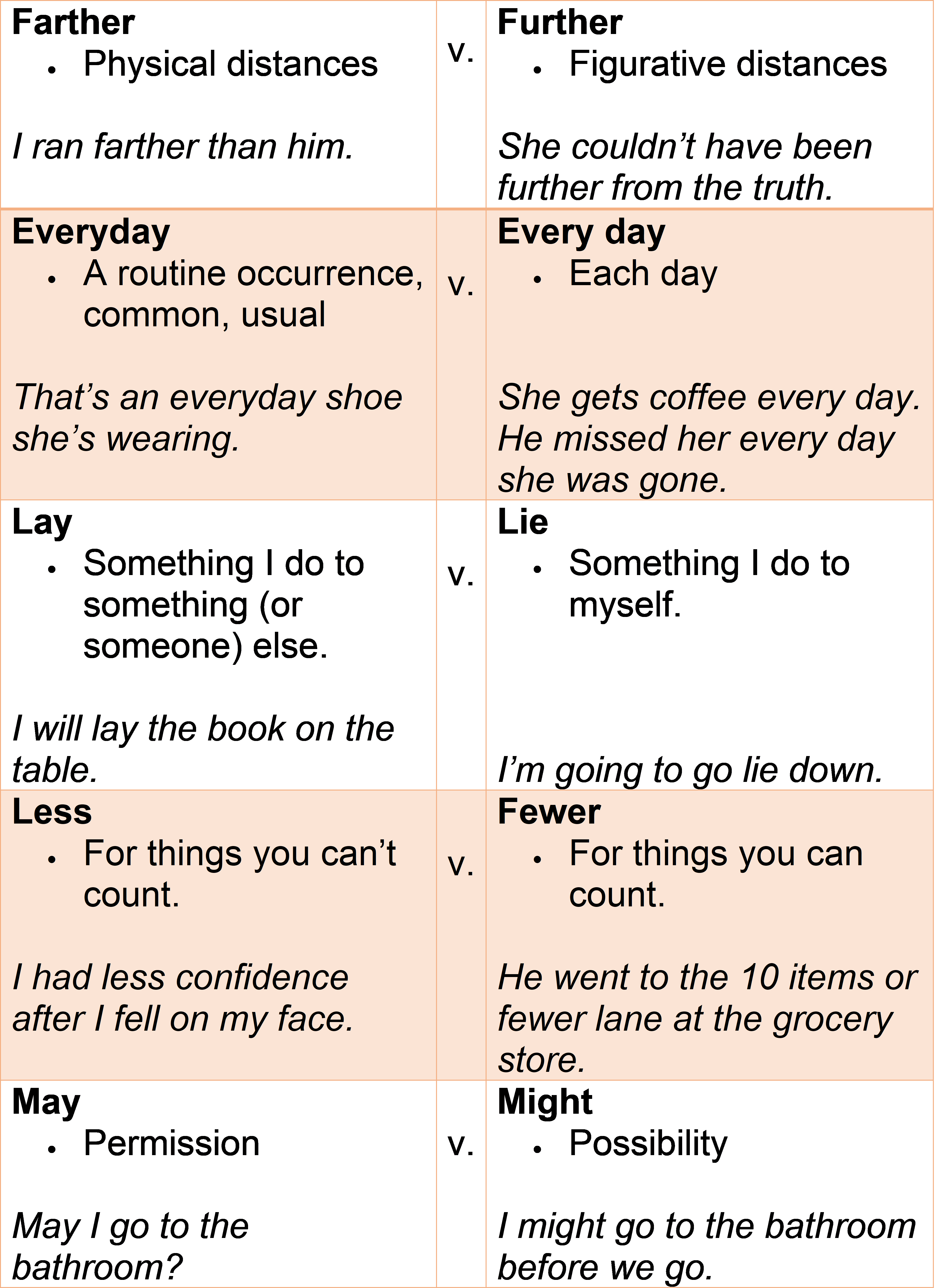Precision and Clarity
EXPLANATION AND EXAMPLES
According to APA (2010), “Precision is essential in scientific writing; when you refer to a person or persons, choose words that are accurate, clear, and free from bias” (p. 71).
Clarity, in turn, means adhering to the following guidelines: “Devices that are often found in creative writing – for example: setting up ambiguity, inserting the unexpected, omitting the expected, and suddenly shifting the topic, tense, or person – can confuse or disturb readers of scientific prose” (APA, 2010, p. 65).
In short, your academic writing should be simple and to the point. It sounds easy, but this style of writing requires developing your writing skills and a dedication to the revision process.
TIPS FOR PRECISION
According to APA (2010), as a writer, you should “make certain that every word means exactly what you intend it to mean” (p. 68). Although not an exhaustive list of precise word choices, these are some of the most commonly misused words in academic writing:

TIPS FOR CLARITY
-
Use transitions
-
Pay attention to verb tense
-
Avoid clichés and colloquialisms
-
Avoid circumlocution
-
Avoid anthropomorphism
-
Avoid the editorial "we"
USE TRANSITIONS
“Readers will better understand you if you aim for continuity in words, concepts, and thematic development from the opening statement to the conclusion” (APA, 2010, p. 65).
This applies to each sentence, paragraph, section, and the overall paper. Here are some common, precise transitional words for academic writing:

PAY ATTENTION TO VERB TENSE
Per APA, use the past tense to discuss things that occurred at a specific, definite time in the past:
The researchers included 15 subjects in their 2016 trial.
Marshall (2017) noted...
You might also use the present perfect tense when things did not occur at a specific, definite time or when things occured in the past and are still happening, like this:
The researchers have been studying 15 subjects since 2016.
Researchers have found…
Verbs are active, vibrant, and full of meaning, and so you should let them do the "heavy lifting" in your writing. Use
the active voice as much as possible, and avoid awkward verb phrases such as these:
AVOID CLICHES AND COLLOQUIALISMS
Language that cannot be universally translated might confuse some readers. In addition, common, everyday diction is not always appropriate in academic writing. Here are some common phrases to avoid:
-
The
doors were closed to advancement
-
In light of recent research
-
The researchers
were getting input from a focus group
-
My journey through my doctoral program
-
They have
taken great strides in
-
Research
has paved the way for
-
This
has spun out of control
Can you think of other commom cliches and colloquialisms to avoid in academic writing? Let us know your best example at [email protected]
AVOID CIRCUMLOCUTION
Circumlocution is a roundabout way of saying what you want to say; using several words to say something simple.
Instead of saying it like this:
“The participants in the study were six young people who have completed three years of elementary education and are not living in an urban area.”
Say it like this:
“The study will include six fourth grade students from a rural elementary school.”
AVOID ANTHROPOMORPHISM
Anthropomorphism means assigning a human attribute to a nonhuman object, or using a verb that describes a human action with a nonhuman noun.
Incorrect:
Narrative
research design studies the lives of individuals and obtains stories about their lives.
Correct:
Narrative
design researchers study the lives of individuals and obtains stories about their lives.
AVOID THE EDITORIAL "WE"
According to APA (2010), “restrict your use of we to refer only to yourself and your coauthors…Broader uses of we leave your readers to determine to whom you are referring” (p. 69).
Unclear/Imprecise:
We know it is best for athletes to strength train, but not all coaches are trained in this.
In our country, we all know the impact of homelessness on children.
Clearer and more precise (and more credible!):
Athletes need to strength train for ideal performance, but there is a lack of adequate coach training programs for sport-specific strength (Marshall, 2018).
Homelessness is related to several negative outcomes for children and youth in the Unites States (Patters, 2017).